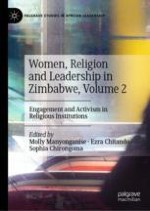2023 | OriginalPaper | Buchkapitel
6. Women’s Leadership in the Guta Ra Jehovha Church: Towards the Construction of ‘Soft Masculinities’
verfasst von : Amos Muyambo
Erschienen in: Women, Religion and Leadership in Zimbabwe, Volume 2
Verlag: Springer Nature Switzerland
Aktivieren Sie unsere intelligente Suche, um passende Fachinhalte oder Patente zu finden.
Wählen Sie Textabschnitte aus um mit Künstlicher Intelligenz passenden Patente zu finden. powered by
Markieren Sie Textabschnitte, um KI-gestützt weitere passende Inhalte zu finden. powered by
